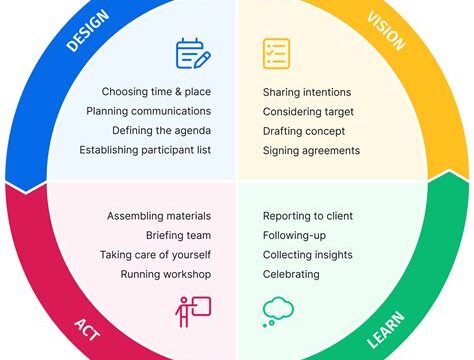Discover the essential elements of successful workshop deliverables, including engaging presentation materials, actionable resources, interactive activities, and technology integration. Tailored to participant needs. Measure impact and feedback.
Key Components of Workshop Deliverables
When planning a workshop, it is essential to consider the key components of the deliverables that will be shared with participants. These components are crucial in ensuring that the workshop is engaging, informative, and impactful for all involved.
One key component of workshop deliverables is the presentation materials that will be used to relay information to participants. These materials should be visually appealing, easy to understand, and interactive to keep participants engaged throughout the workshop.
Another important component is the actionable resources that will be provided to participants. These resources should be practical and relevant to the subject matter of the workshop, giving participants the tools they need to apply their new knowledge in their own lives or work environments.
Creating Engaging Presentation Materials
Creating Engaging Presentation Materials
When it comes to delivering an impactful workshop, the presentation materials play a crucial role in engaging and retaining the participants’ attention. The key to creating engaging presentation materials lies in the way information is presented and the visuals used to support it. The materials should be visually appealing, easy to understand, and interactive to keep the audience engaged throughout the workshop.
Utilizing strong visuals such as infographics, charts, and images can help to convey information more effectively and make the content more engaging. Incorporating storytelling elements into the presentation materials can also captivate the audience and make the information more relatable. Additionally, using multimedia elements like videos and audio clips can enhance the learning experience and make the materials more dynamic and interesting.
Another important aspect of creating engaging presentation materials is to ensure that the content is tailored to the audience’s needs and preferences. Understanding the participants’ background, knowledge level, and interests can help in creating materials that are relevant and engaging for them. By customizing the materials to the participants, the workshop can become more inclusive and impactful, ultimately leading to a more successful learning experience.
Providing Actionable Resources for Participants
When conducting workshops, it’s important to provide participants with actionable resources that they can use to apply the knowledge they’ve gained. These resources should be practical and easily accessible, allowing participants to immediately start implementing what they’ve learned. This could include templates, checklists, guides, or other tools that can help them put their new knowledge into practice.
In addition to physical resources, it’s also beneficial to provide digital resources that participants can access even after the workshop is over. This could be in the form of online guides, video tutorials, or downloadable materials that they can refer back to as needed. By offering a combination of physical and digital resources, participants are more likely to retain the information and continue to benefit from the workshop long after it has ended.
It’s also important to tailor these resources to the specific needs and interests of the participants. Not every resource will be relevant to every individual, so customization is key. By understanding the unique goals and challenges of the participants, workshop leaders can provide resources that are truly actionable and valuable to each individual.
Incorporating Interactive Learning Activities
Incorporating interactive learning activities into workshops can greatly enhance participants’ engagement and retention of information. By integrating activities such as group discussions, role-playing exercises, and hands-on simulations, facilitators can create a more dynamic and stimulating learning environment. These activities not only break up the monotony of traditional lectures, but also encourage active participation and collaboration among participants.
Furthermore, interactive learning activities provide opportunities for real-time application of concepts, allowing participants to better understand and retain information. Whether it’s through scenario-based exercises or problem-solving tasks, these activities promote critical thinking and practical skill development. By incorporating such activities, workshop facilitators can ensure that participants are not just passively receiving information, but are actively applying and internalizing it.
Additionally, interactive learning activities can help to foster a sense of community and camaraderie among participants. By working together in group activities, individuals are able to establish connections, share insights, and learn from one another. This collaborative environment not only enriches the overall learning experience, but also encourages knowledge sharing and peer support.
Encouraging Knowledge Sharing Among Participants
Encouraging Knowledge Sharing Among Participants
Encouraging knowledge sharing among participants is a crucial aspect of any workshop. When participants share their knowledge and experiences, it creates a collaborative learning environment where everyone can benefit from each other’s expertise. One way to encourage knowledge sharing is to create activities and discussions that prompt participants to share their insights and best practices. By incorporating group discussions, Q&A sessions, and interactive exercises, participants are given the opportunity to share their knowledge and learn from others in the workshop.
Another effective method for encouraging knowledge sharing is to create a safe and inclusive space where participants feel comfortable expressing their thoughts and ideas. It’s important to establish ground rules that promote respectful communication and active listening. This can help participants feel more confident in sharing their knowledge without fear of judgment or criticism. Additionally, providing opportunities for networking and informal conversations can further foster a sense of community and encourage participants to share their expertise with one another.
Furthermore, utilizing technology can also enhance knowledge sharing among participants. Platforms such as online forums, virtual brainstorming tools, and collaborative document sharing can facilitate ongoing discussions and knowledge exchange beyond the workshop sessions. By providing accessible and user-friendly technology, participants can continue to engage with each other and share valuable resources and insights long after the workshop has ended.
Utilizing Technology for Enhanced Learning
Utilizing Technology for Enhanced Learning
When it comes to enhancing the learning experience in workshops, technology can be a powerful tool. By utilizing various types of technology, workshop facilitators can provide participants with a more interactive and engaging learning experience. One way to incorporate technology into workshops is by using online platforms or software that allow for virtual collaboration and interaction. This can be especially helpful for workshops with remote participants, as it enables everyone to participate and contribute regardless of their location.
Another way to utilize technology for enhanced learning is by incorporating multimedia elements into presentations and materials. This can include using videos, audio clips, and interactive graphics to supplement the content being presented. By doing so, facilitators can appeal to different learning styles and make the material more engaging and memorable for participants.
Furthermore, technology can be leveraged to provide participants with access to additional resources and materials beyond the workshop sessions. For example, facilitators can create an online portal or digital library where participants can access relevant articles, videos, and other educational resources. This allows participants to continue their learning journey even after the workshop has ended, and provides them with a valuable resource they can refer back to as needed.
Tailoring Deliverables to Participants’ Needs
Tailoring Deliverables to Participants’ Needs
When planning a workshop, it is crucial to consider the specific needs and preferences of the participants in order to ensure a successful and impactful event. Tailoring the deliverables to participants’ needs means taking into account their prior knowledge, interests, and learning styles. This can be achieved through pre-workshop surveys or interviews to gather information about the participants’ expectations and objectives for the workshop.
One way to tailor deliverables to participants’ needs is to offer a variety of resources and materials that cater to different learning styles. For example, visual learners may benefit from slideshows and infographics, while auditory learners may prefer audio recordings or live presentations. By providing a mix of written, visual, and interactive materials, workshop organizers can ensure that all participants are engaged and able to absorb the information effectively.
Furthermore, workshops can be tailored to participants’ needs by incorporating case studies or examples that are relevant to their industry or specific challenges. This not only makes the content more relatable and applicable to the participants’ work, but also encourages active participation and knowledge sharing among the attendees. By acknowledging and addressing the specific needs of the participants, workshop organizers can create a more inclusive and impactful learning experience for all involved.
Measuring Impact and Feedback from Participants
Measuring Impact and Feedback from Participants
When it comes to evaluating the success of a workshop, measuring impact and collecting feedback from participants is essential. There are various ways to gauge the effectiveness of the deliverables, whether it’s through surveys, interviews, or post-workshop assessments. By gathering input from attendees, workshop facilitators can gain valuable insights into the overall impact of the program and identify areas for improvement.
One key method for measuring impact and feedback from participants is through the use of quantitative and qualitative data. This can include tracking attendance rates, analyzing pre and post-workshop knowledge assessments, and soliciting open-ended responses from attendees. By examining both the numbers and the narratives, workshop organizers can paint a comprehensive picture of the workshop’s impact.
Furthermore, measuring impact and feedback from participants provides an opportunity for continuous improvement. By actively seeking input from those who have participated in the workshop, facilitators can iterate and enhance future deliverables. This ongoing feedback loop ensures that the program stays relevant and responsive to the needs of its participants.
Frequently Asked Questions
What are workshop deliverables?
Workshop deliverables are the tangible outcomes that participants can take away from the workshop, such as handouts, templates, tools, and resources.
How do workshop deliverables benefit participants?
Workshop deliverables provide participants with valuable knowledge, skills, and resources that they can apply in their work or personal life.
What are some examples of workshop deliverables?
Examples of workshop deliverables include worksheets, guides, checklists, software demos, case studies, and presentations.
How can workshop deliverables be shared with participants?
Workshop deliverables can be shared through physical handouts, digital downloads, email attachments, USB drives, or access to an online portal.
What is the importance of sharing knowledge and resources in workshops?
Sharing knowledge and resources in workshops enhances the learning experience, fosters collaboration, and empowers participants to apply what they have learned.
How can workshop facilitators ensure the effective delivery of workshop deliverables?
Workshop facilitators can ensure effective delivery by organizing materials in a logical sequence, providing clear instructions, and allowing time for participants to ask questions.
Where can workshop facilitators find valuable resources for workshop deliverables?
Workshop facilitators can find valuable resources for workshop deliverables from reputable websites, professional networks, industry associations, and educational institutions.





